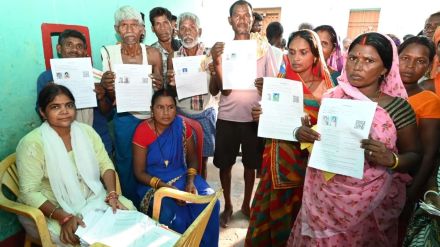Syllabus:
GS2: Salient Features of the Representation of People’s Act.
Context:
The NGO, Association for Democratic Reforms (ADR), has approached the Supreme Court challenging the Election Commission’s ‘special intensive revision of electoral rolls’ in Bihar, terming it unconstitutional, saying it would disenfranchise lakhs of voters.
More on the News
- The petition filled against Election Commission of India (ECI) directing for Special Intensive Revision of Electoral Rolls in Bihar (SIR Order) as being in violation of Articles 14, 19, 21, 325 and 326 of the Constitution of India as well as provisions of Representation of People’s Act, 1950 and Rule 21A of the Registration of Electors Rules, 1960.
- The plea said the declaration, as required under the special intensive revision process, is violative of Article 326 “in so far as it requires a voter to provide documents to prove his/her citizenship and also citizenships of his/her mother or father, failing which his/her name would not be added to the draft electoral roll and can be deleted from the same”.
- It has excluded identification documents such as Aadhar or ration cards which further make marginalised communities and the poor more vulnerable to exclusion from voting.
- According to the Election Commission of India, any person whose name is not recorded in the 2003 Electoral Rolls needs to submit at least one of 11 documents establishing eligibility to vote.
- According to the ECI instructions, the list of 11 is indicative, not exhaustive. This is because under the Representation of the People Act, 1950, the Electoral Registration Officers (EROs) are empowered to make the electoral roll and the EC can only issue guidelines.
Key Reasons Behind Electoral Revision
- Inclusion of the names of foreign illegal immigrants.
- Frequent migration.
- Young citizens becoming eligible to vote and the non-reporting of deaths.
Eleven Documents and its associated challenges
- Govt Service ID/Pension Order: Only 1.57% of Bihar’s population were in government service as per the 2022 Caste Survey.
- Pre-1987 Govt Document: Includes IDs from government, local bodies, banks, etc.; data on usage is unavailable.
- Birth Certificate: Issued under RBD Act, 1969 by local bodies; process varies in rural and urban areas.
- Passport: Issued after police verification; only 2% of Bihar’s population held valid passports till 2023.
- Matriculation/Education Certificate: 14.71% completed Class 10; dropout rates remain high, especially in Classes 6–8.
- Permanent Residence Certificate: Issued by state after document verification; process may take over 15 days.
- Forest Rights Certificate: Granted via Gram Sabha and District Committee to STs and traditional forest dwellers.
- Caste Certificate (SC/ST/OBC): Caste-wise population data available, but no records on actual certificate holders.
- National Register of Citizens: Not applicable in Bihar.
- Family Register: Maintained by local bodies; records detailed household and demographic information.
- Land/House Allotment Certificate: Most rural households lack land ownership; 65.58% had no land as per the 2011 Census.
Special Intensive Revision of electoral rolls:
Article 324(1) of the Constitution empowers the Election Commission of India (ECI) with the authority of “superintendence, direction, and control” over:
- The preparation of electoral rolls.
- The conduct of elections to Parliament and state legislatures.
Section 21(3) of The Representation of the People Act, 1950 further enables the ECI to order a special revision of electoral rolls for any constituency (or part thereof) “in such manner as it may think fit.”
• Mechanisms of Electoral Roll Revision: Under the Registration of Electors’ Rules, 1960, revisions can be conducted in two ways:
- Intensive Revision – The electoral roll is prepared afresh (a complete overhaul).
- Summary Revision – The existing roll is updated or amended (incremental changes).
- The ECI can also direct a hybrid approach (partly intensive, partly summary).
Special summary revisions take place every year, and the electoral roll is updated before each Lok Sabha and state Assembly election.
Intensive revisions have been carried out in 1952-56, 1957, 1961, 1965, 1966, 1983-84, 1987-89, 1992, 1993, 1995, 2002, 2003 and 2004.

